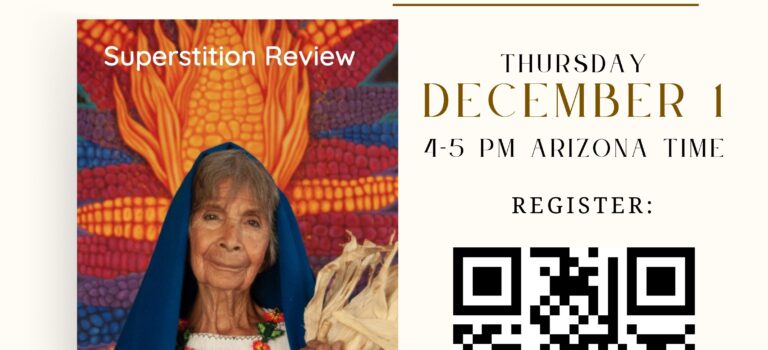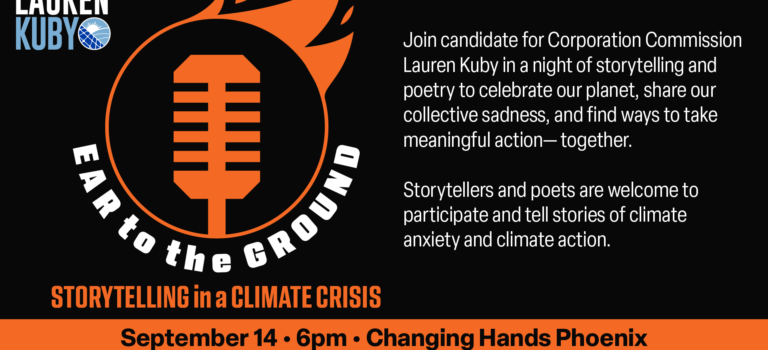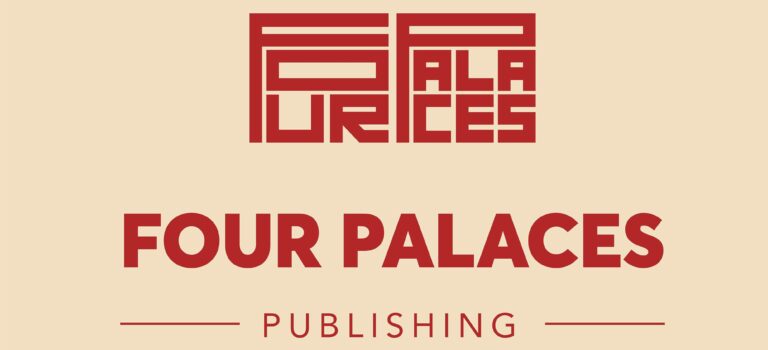Less than a month to go for our Issue 30 Launch Party!
Join us on December 1 from 4:00 – 5:00 PM Arizona Time to celebrate with us. We look forward to seeing you there!
The Online Literary Magazine at Arizona State University

Congratulations to Roxanne Doty for her debut novel Out Stealing Water, published by Regal House. Originally a finalist in the Autumn House 2019 fiction contest, Out Stealing Water follows Emily, who must live without water after the city shuts off her family’s access. Her uncle Dwight, who doesn’t believe he should pay for water, simply steals it from others. This is when Emily and her cousin Paula begin stealing, too, trying to collect enough money to leave Phoenix. As their crimes escalate, Dwight joins forces with an armed anti-government group to keep his land out of the government’s hands.
…The consideration of class energize[s] the narrative, which quickly but effectively builds to a suspenseful final act. Sublime characters stick together in moral dilemmas and gripping drama.
Kirkus reviews
Roxanne Doty taught and did research at ASU for 30 years in the School of Politics and Global Studies. Her work has been published in Forge, I70 Review, Soundings Review, Four Chambers Literary Magazine, Lascaux Review, Lunaris Review, Journal of Microliterature, NewVerseNews, Saranac Review, Gateway Review and Reunion-The Dallas Review. Her short story “Turbulence,” published in Ocotillo Review, was nominated for the 2019 Pushcart Prize. To learn more, visit her website.
The current conflicts in our different Americas are an integral part of Out Stealing Water, not just touched on but the very foundation that holds the plot together from privilege to poverty, spirituality to doubt, money and power to hardscrabble lives lived on the brink of our cities. The story explores our culture in which losing and winning come down to the dreams and promises on a postcard. Read this illuminating book! It will shine in the dark while you stay awake, hurrying to find out what is next, but slowing down to savor Roxanne Doty’s writing and the depth of her novel.
Kate Green, author of Shattered Moon
To purchase Out Stealing Water, go here.
Roxanne Doty’s short story “Neighbors” appeared in Issue 27 of Superstition Review.

Winner of an American Book Award for his poetry collection Currents, Bojan Louis is making his fiction debut with Sinking Bell: Stories. Published by Graywolf Press, Sinking Bell: Stories is a collection that centers on collisions of love, cultures, and racism. All of Louis’s stories take place in or near Flagstaff, Arizona, and they include stunning portrayals of all kinds of people—from metalheads to construction works—struggling to live their complicated lives.
Louis’s prose carries his poetic sensibility with a decided rhythm and resonant detail, and the narrators achingly convey their outsider status. The result is immersive and powerful.
publishers weekly
Bojan Louis is Diné of the Naakai dine’é, born for the Áshííhí. His debut novel Currents received an American Book Award in 2018. His work has been published in Alaska Quarterly Review, Ecotone, Yellow Medicine Review, and elsewhere. He currently teaches creative writing at the University of Arizona. To learn more about him, visit his website.
Sinking Bell doesn’t shy away from the dim corners of life. . . . You’re going to want to take your time with this one, and then you’re going to want to press it into the hands of all your best people.
Kelli Jo Ford, author of crooked hallelujah
To purchase Sinking Bell: Stories, go here.
An interview with Bojan Louis—”Auditory Hallucinations”—appeared in Issue 20 of Superstition Review.

Congratulations to Philip Gross for his upcoming poetry collection The Thirteenth Angel, published by Bloodaxe Books. Coming November 17, 2022, Gross’s collection examines patterns in the world around us and also within ourselves. It teeters between the before and after of the pandemic years, focusing in the opening sequences on almost-aerial views of London streets and Europe’s motorways. It ultimately reveals that “if there are angels, they are nothing otherworldly, but formed by angles of incidence between real immediate things.”
Moving from island to island, continent to continent, Between the Islands is concerned with memories, with resonances throughout time, but also with emergent dangers; ecological fears and the rising islands of refuse accumulating in our oceans.
Poetry Book Society Bulletin, Spring 2020 [on Between the islands]
Philip Gross has written over twenty books of poetry and won a number of awards, including the TS Eliot Prize for his book The Water Table. To learn more about Gross, visit his website.
Great poetry is like walking on water. In this paradoxical, humane collection, Philip Gross achieves that miracle.
Polly clark, The Guardian [on the water table]
To preorder The Thirteenth Angel, go here.
Philip Gross’s poem “Survivor” appeared in Issue 6 of Superstition Review.
Internship Opportunities with Superstition Review
Superstition Review is the online literary magazine produced by creative writing and web design students at Arizona State University. Founded in 2008, the mission of the journal is to promote contemporary art and literature by providing a free, easy-to-navigate, high quality online publication that features work by established and emerging artists and authors from all over the world.
We publish two issues a year with art, fiction, interviews, nonfiction, and poetry. We also enjoy honoring all members of our Superstition Review family by maintaining a strong year-round community of editors, submitters, contributors, and readers on our blog and social networks.
Trainees
Trainees will register for a 3 credit-hour ENG 394 course. The course will offer a study of the field of literary magazines.
Upon successful completion of ENG 394, trainees will enroll in ENG 484 and become active interns with the magazine.
What Interns Say:
This class has been a huge eye-opener for me and I feel so lucky to have had the opportunity to work in the publishing and editing industry before graduating.
The skills I learned have given me a huge amount of confidence as I begin my search for a job, and I’m so glad this course was available.
I feel I got a great internship experience that will help me post graduation.
Read more about us on our social networks:

Congratulations to Jen Michalski for her new short story collection The Company of Strangers, coming in January 2023. Published by Braddock Avenue Books, The Company of Strangers follows members of Generation X, who are often queer and always searching for meaning and happiness in their lives. Michalski examines the themes of eroding community and family in a variety of ways: from a gay man suddenly confronted with parenthood to a lesbian having an affair with her brother’s wife.
The Company of Strangers is perfect for those searching for messy characters who are confused about what kind of lives they’ve lived and looking for ways to make meaning in them.
Fueled by love, longing, and regret, these captivating stories drop us into the lives of people we come to care deeply about. These are rich, wild, surprising romps of stories with endings that wow. What an immense pleasure to be in the company of these strangers, thanks to Jen Michalski’s brilliant storytelling.
Kathy Anderson, author of Bull and Other Stories
Jen Michalski’s work includes The Tide King, The Summer She Was Underwater, Close Encounters, and others. To learn more about her, visit her website.
A kaleidoscopic and candid exploration of the gritty corners of our desires and all that is left unsaid. By turns irreverent and deeply heartbreaking, Michalski masterfully constructs a collage of sexuality, belonging, and a search for what is possible atop strip malls, parking lots, and bowling alleys. Reminiscent, in some ways, of the genre-pushing work of Zach Doss, Etgar Keret, and Kim Chinquee, Michalski unequivocally carves out a space that is all her own—daring, deeply human, and often gut-wrenching.
Sequoia nagamatsu, author of how high we go in the dark
To preorder The Company of Strangers, go here.
Jen Michalski’s short story “Are You Ready to be Heartbroken?” appeared in Issue 27 of Superstition Review.

Congratulations to Lynn Mundell for her new chapbook Let Our Bodies Be Returned to Us. Winner of Yemassee Journal’s 2021 Fiction Chapbook Contest, Mundell’s chapbook is a vivid, visceral look at womanhood. Comprised entirely of flash fiction pieces, Mundell proves she is a master at reaching profound depths with only a few words.
Although Let Our Bodies Be Returned to Us focuses on women, there is no one type of woman Mundell writes about. Young and old, idealized and flawed—she writes with empathy about sisters, mothers, and women who simply are. No two stories are the same: Mundell writes as an unborn, reincarnated baby in her first story “Again,” and later she writes from Mona Lisa’s point of view in “Smile, Lisa.” Her final piece, “Let Our Bodies Be Returned to Us,” is a mesmerizing capstone to a brilliant chapbook. Let Our Bodies Be Returned to Us is perfect for those looking for a collection that’s short but poignant.
The wit, warmth, and skill of this writer struck me immediately. These stories are smart but not smart-alecky, quirky yet polished, broad in their emotional appeal and sharp in their resonance. Again and again, I was taken by surprise—by the originality of the prose, the ingenuity of each scenario, the impact delivered by such a small number of words. I felt for these characters—the sisters in “Cloise,” about to be split apart, the lonely boy in “Mother and Child,” the broken family in “Big Baby,” the pregnant women who refuse to dim their hopes in “Our Bright Lights On.” Though many of these stories are heart-rending, I also found myself smiling, uplifted. This collection and this writer are ready for prime time.
Mira T. Lee, author of the novel Everything Here is Beautiful
Lynn Mundell is a short story writer, publisher, and editor. She and Grant Faulkner founded 100 Word Story in 2010, and her story “Again” appeared in Issue 17 of Superstition Review. To learn more about Lynn Mundell, go to her website.
To purchase Let Our Bodies Be Returned to Us, go here.
We’re also very excited to share an interview that dives deeper into Mundell’s chapbook. This interview was conducted via email by our Blog Editor, Brennie Shoup.
Brennie Shoup: Much of your work is flash fiction. Could you talk about what draws you to this form, and how flash fiction appears in Let Our Bodies Be Returned to Us?
Lynn Mundell: Flash fiction enables us to tell our stories in intimate ways—a secret whispered into an ear; a tale told over a quick warm drink. We boil down the story to its essence, leaving the tea leaves or coffee grounds for later scrutiny. For me it’s been the marriage of my original writing as a poet with my lifelong love of a good story. All of the stories in my chapbook are flash. They include 100-word stories in triptychs, some using numbering and headings for short sections, traditionally plotted longer flash, and some hybrid pieces where poetry and fiction congregate. The first story in the collection is called “Again,” about a baby born over and over and over again that was inspired by a black and white photo of a happy young family. It was published in Superstition Review and remains one of my favorite stories to have told and to read to others, so thank you, Superstition Review!
BS: The original “Let Our Bodies Be Returned to Us” was published in 2018 in Booth. Could you talk about what inspired the piece and how it ended up as the title for your chapbook?
LM: “Let Our Bodies Be Returned to Us” was actually inspired by a very small airplane seat on a flight from Phoenix to Santa Fe! Where the rest of that piece came from is a mystery to me, but there must have been a lot of feelings about how women’s bodies are used and used up that fed into it. I definitely tapped into everything from being hit on when I was younger to breastfeeding my kids. I wrote it at a writing retreat hosted by Meg Tuite and Robert Vaughn that encouraged crossing the border between poetry and fiction writing. I recommend working with these writers or just any sort of a change of scenery for a way to feel freed and inspired to produce new things. I sometimes camp out in a new location for four or five days to unplug and have found my best stories come from these times where I am seeing new things while also working in total isolation. When it was time to organize my stories, “Let Our Bodies” really encapsulated the theme for the whole book, plus it made for an intriguing book title that could also provide a lot of fodder for the cover illustration.
BS: Could you discuss the main themes of your chapbook? How have these themes developed over your career? Do you find yourself writing about the same ideas over and over again?
LM: The theme of the book is women’s bodies—what they are capable of, how they are viewed and objectified, as sources of comfort and conflict, and how ultimately women own them. The book is organized from birth to end of life, and each piece is from a female point of view. The theme surprised me as I sorted through my work looking for the common thread. I have other stories I like that did not fit into the collection thematically at all, and one of the most difficult things about creating the collection was having to give these pieces the heave-ho. I have written everything from ghost stories to creative nonfiction about my early teens living in Iran. Frankly, writing wise I am all over the map.
Typically I write a piece and sort of hope that there will be something cohesive among a few years of my work, but there isn’t always—which is why it took many years for this book to come about with its theme that finally surfaced. I admire writers who can set out to write to a theme and have a collection they are purposefully working toward. I was recently trying to write connected fables about animals, but have thus far only created one I like, about a mother and baby elephant that was published in The Masters Review. I’d like to keep trying on that, but may need to expand the theme to just fables in general or even fables and fairy tales.
BS: Do you have plans for future chapbooks, short story collections, or novels?
LM: I would love to write more books. But right now I am just writing and we will see where that goes. During the pandemic I have sort of gotten off the script of life in general, and in writing toward a publishing objective of any kind, with one thing being very different from the next. This has included a long fairy tale published in Gone Long, a book review for a friend’s new collection in Necessary Fiction, a four-part piece about fishing with my father in Under the Gum Tree, a creative nonfiction about family depression written to a painting in The Ekphrastic Review, a longer mystery in collaboration with artist Merrick Adams in 7x7LA, and others that are pushing what I typically do. At the end of this year I’ll look everything over and see if there is a pattern for a new book or one thing that I like enough as a starting point for a new book. I will say that I have continued to find great joy in writing as well as reading the incredible work that is out there lately.
What I love about writing is the wonderful sense of freedom. In our daily lives we are constrained by the demands of work, family, duty, society, finances, and so forth. But in writing we can leave all of that behind to explore anything with total abandon.


On September 14 at 6pm, Lauren Kuby will be at the Changing Hands Bookstore in Phoenix to exchange poetry and stories about the environment and environmental crisis. Please note that performer signups are limited, and these signups close September 7.
The Changing Hands Bookstore is unique to Arizona and offers new and used books. They often host author events.
Lauren Kuby is a sustainability scientist at Arizona State University and a recognized national champion for climate action and clean energy.
Register here to join!

Congratulations to Eric Tran for his new poetry collection Mouth, Sugar, and Smoke, published by Diode Editions. Winner of the 2021 Diode Editions Full-Length Book Prize, this collection “grieves a lover lost to addiction and also swims in the intoxication of desire.” Tran explores themes of grief, lust, and queerness using a variety of poetic forms. Although not limited to one type of poem or one specific subject, Tran’s poetry remains united to create a cohesive piece. Poems selected for the collection are visceral and candid as Tran dives into his own emotions, writing “I’m lousy and bloated / with love.” His poetry is perfect for those searching for a deep discussion of intimacy.
Wounds, here, are not ornamental. Tenderness, here, is as restless and resilient as pain. The poems refuse transformation, superficial resolutions. Instead, the language—unsparing, striking—attends to addiction and death with grace, awe. The emotional complexity is mirrored structurally: the lines waterfall and halt, a sonnet crown jolts awake the mind, sentences simmer with lyrical momentum. Eric Tran’s second book is heart-rich and deftly written—the poems will stay with you long after you finish reading it.
Eduardo c. corral, author of guillotine
Eric Tran is a queer Vietnamese writer and physician. He currently lives in Portland, Oregon. Mouth, Sugar, and Smoke is his second book of poetry, and his work has appeared in RHINO, 32 Poems, the Missouri Review, and elsewhere. To learn more about Eric Tran, go to his website.
I resent no one / the instinct to run’ writes Eric Tran in his brave and beautiful Mouth, Sugar, and Smoke. But this is a poet who never runs. In fact, he pushes deep into the raw center of desire, admitting ‘I’ve wanted your picked-at / scab, your broken voice through a / morning-night call.’ This is a book of lust and brokenness, of ‘suffering as hot / and clean as a pistol’s mouth.’
Aaron Smith, author of The book of daniel
To purchase Mouth, Sugar, and Smoke, go here.
Eric Tran’s poem “Untitled (Portrait of Ross in L.A.)” appeared in Issue 18 of Superstition Review.


Four Palaces Publishing is currently open to submissions for their fiction anthology contest. They are searching for short stories between 2,000 and 6,000 words long. They will also accept up to three flash fiction pieces. The theme of their anthology is “Desire to Escape.” The author of the winning story will receive $1,000 and a mentorship from guest judge Ivelisse Rodriguez, whose short story collection Love War Stories was a 2019 PEN/Faulkner finalist and a 2018 Foreword Reviews INDIES finalist.
Founded in 2021, Four Palaces’ goal is to promote and publish works by previously unpublished writers from underrepresented communities.
Frederick Tran is the executive director and publisher of Four Palaces. Emily Townsend is the managing editor, and her nonfiction piece “Consider the Honeybee” appeared in Issue 19 of Superstition Review.
Submissions close August 31, 2022! Go here to submit your story.